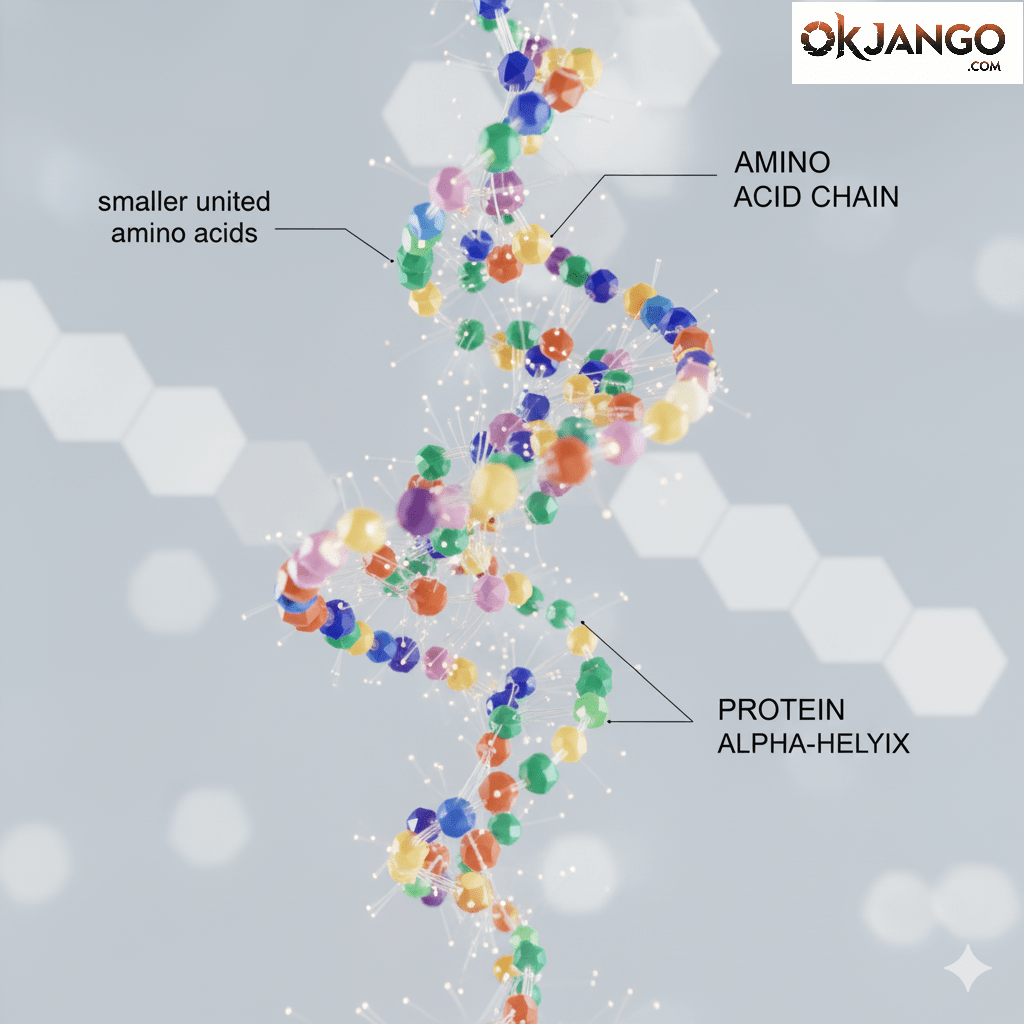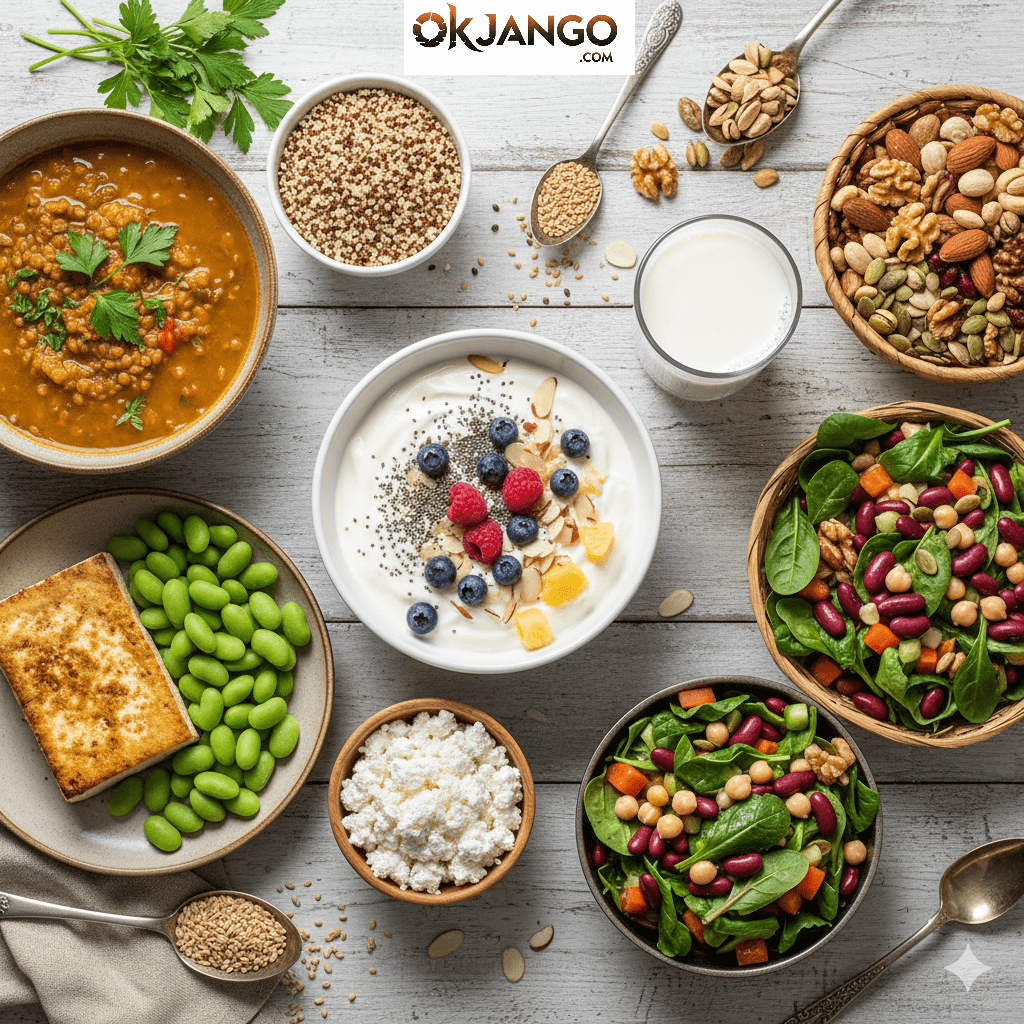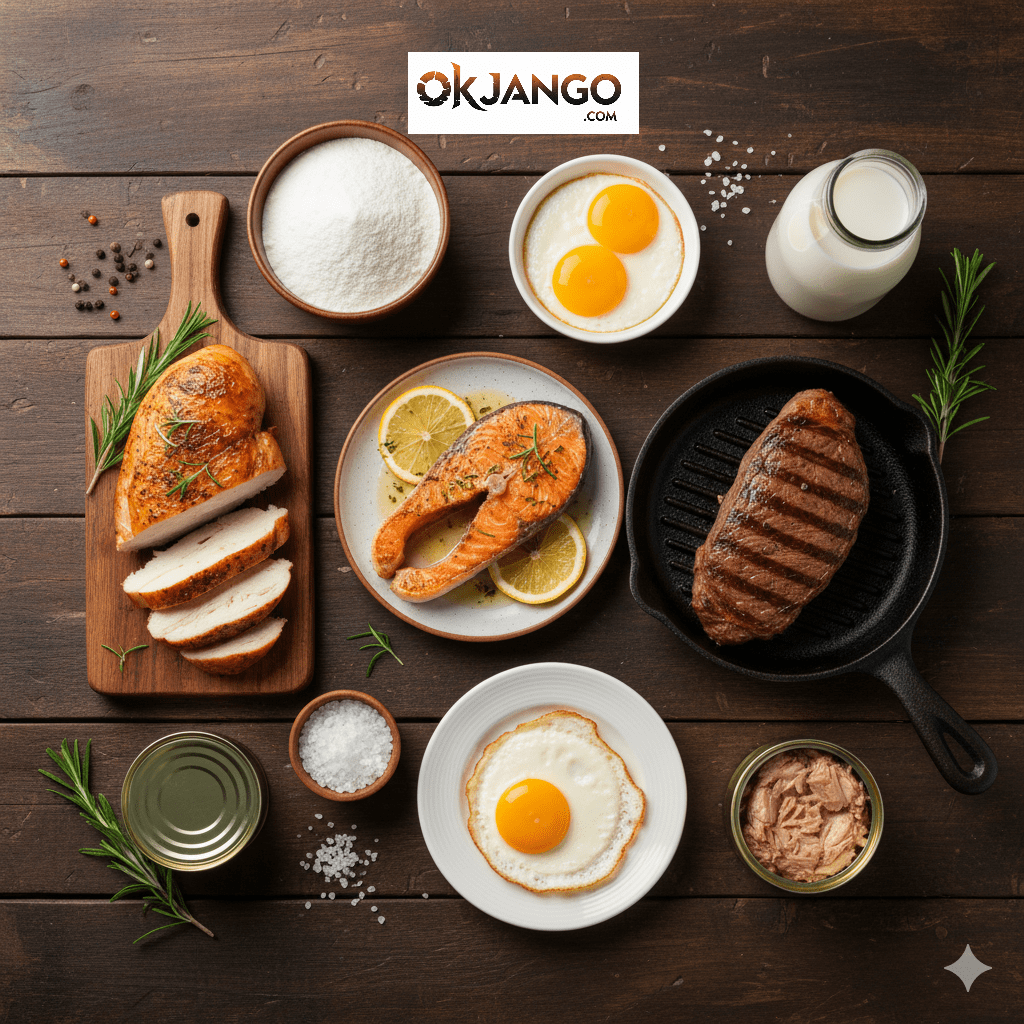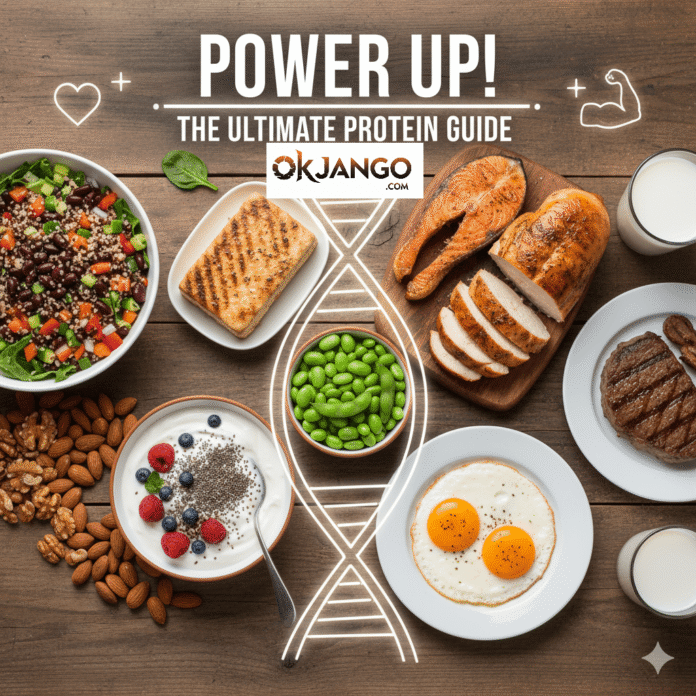Protein: it’s not just a buzzword for bodybuilders. It is one of the most vital macronutrients, playing an indispensable role in nearly every process within your body. Understanding what protein is, why it’s so important, and where to find it can be the key to unlocking better health and vitality.
🧱 What is Protein? The Body’s Master Builder and Essential Worker
Think of your body as a massive, high-tech city under constant construction and renovation. If carbohydrates are the gas that powers the delivery trucks, then protein is the essential raw material—the steel, concrete, and lumber—plus the entire crew of architects and engineers.
The Building Blocks of Life: Amino Acids
Every protein is made up of smaller units called amino acids. There are 20 different types, which link together like beads on a necklace in countless combinations to form everything your body needs.
Essential vs. Non-Essential: Your body is a great manufacturer, but it can’t make all 20. Nine of them, called essential amino acids, must be supplied daily through the food you eat.
Why Protein is the Ultimate MVP for Your Health
Protein isn’t just about big muscles; it’s involved in virtually every critical process, making it a true Most Valuable Player (MVP) nutrient:
| Protein Role | Key Function & Analogy | Benefits for Your Health |
| Repair and Regeneration | The raw material for fixing wear and tear, from skin to strained muscle fibers. | Helps the body rebuild itself, crucial for muscle growth and recovery. |
| The Workforce (Enzymes & Hormones) | Transforms into engineers (enzymes) and managers (hormones) regulating bodily processes. | Governs metabolism, digestion, sleep, and overall body signaling. |
| The Defense System (Immunity) | Forms antibodies, your body’s dedicated soldiers against pathogens. | Strengthens your immune system to fight off bacteria and viruses. |
| Sustained Energy & Satiety | Takes longer to digest, providing a steady energy release and signaling fullness. | Acts as a natural “off” switch for hunger, supporting appetite and weight management. |
Your Go-To List of Protein-Rich Foods
Whether you follow a plant-based diet or include meat and dairy, a huge variety of delicious foods can help you meet your daily protein needs.
🌿 Protein Rich Foods for Vegetarians
For those avoiding meat, eggs, and fish, a combination of plant sources can provide all the essential amino acids your body needs.
| Food Category | Examples | Protein per Serving (Approx.) | Key Benefits |
| Legumes | Lentils, Chickpeas, Black Beans, Kidney Beans | 15-18g per cooked cup | Excellent source of fiber, iron, and B vitamins. |
| Soy Products | Tofu, Tempeh, Edamame | 10-20g per 100g/cup | Tofu/Tempeh are complete proteins, rich in calcium. |
| Dairy | Greek Yogurt, Cottage Cheese, Milk, Paneer (Indian Cheese) | 8-28g per cup/serving | High in calcium and vitamin D; Greek yogurt is highly concentrated. |
| Grains/Seeds | Quinoa, Amaranth, Chia Seeds, Hemp Seeds | 8g per cooked cup (Quinoa); 5-7g per 2 Tbsp (Seeds) | Quinoa and Hemp Seeds are complete proteins. Seeds are rich in Omega-3s. |
| Nuts | Almonds, Peanuts, Pistachios | 6-7g per 1/4 cup serving | Rich in healthy fats and magnesium; convenient snack. |
🥩 Protein Rich Foods for Non-Vegetarians
Animal-based sources are often considered “complete proteins,” as they contain all nine essential amino acids.
| Food Category | Examples | Protein per Serving (Approx.) | Key Benefits |
| Poultry | Chicken Breast, Turkey Breast | 25-30g per 3.5oz (100g) serving | Lean, versatile, and an excellent source of Niacin and B6. |
| Fish | Salmon, Tuna, Mackerel, Sardines | 20-25g per 3.5oz (100g) serving | Rich in protein and essential Omega-3 fatty acids, good for heart and brain health. |
| Meat | Lean Beef, Pork Loin | 20-25g per 3.5oz (100g) serving | High in iron, zinc, and B vitamins. Choose lean cuts to limit saturated fat. |
| Eggs | Whole Eggs | 6g per large egg | Contains all essential amino acids (a complete protein) and a range of vitamins. |
| Dairy | Whey and Casein protein from milk | High-quality, easily absorbed complete protein. |
How Much Protein Do You Need?
The Recommended Dietary Allowance (RDA) for protein is often cited as the minimum to prevent a deficiency, but individual needs can vary widely based on age, activity level, and health goals.
The general RDA for healthy adults is 0.8 grams of protein per kilogram of body weight per day.
| Age Group / Status | Recommended Daily Intake (RDA/General Guideline) | Notes |
| Children (Ages 1-3) | 13 grams | Essential for rapid growth and development. |
| Children (Ages 4-8) | 19 grams | Needs increase as children become more active. |
| Children (Ages 9-13) | 34 grams | Significant intake required during this pre-puberty growth phase. |
| Teens (14-18) – Girls | 46 grams | Protein is vital for growth spurts and muscle development. |
| Teens (14-18) – Boys | 52 grams | Higher requirements due to typically larger body mass and muscle development. |
| Healthy Adults (18-65 years) | 0.8 g/kg of body weight | This is the minimum to maintain basic function. |
| Older Adults (65+ years) | 1.0−1.2 g/kg of body weight | A higher intake is recommended to counteract age-related muscle loss (sarcopenia). |
| Active/Athletes | 1.2−2.0 g/kg of body weight | Higher amounts are needed for muscle repair and growth, especially for resistance training. |
| Pregnant/Lactating Women | A few grams above the standard RDA | Required for fetal growth and milk production. |
Example Calculation: A healthy adult who weighs 70 kg (about 154 lbs) would need approximately 70×0.8=56 grams of protein per day.
Important Note: It is always best to consult with a healthcare provider or a registered dietitian to determine the ideal protein intake for your specific health needs and goals.
Frequently Asked Questions (FAQs)
What are the best high-protein foods for muscle gain?
The best protein foods for muscle gain include chicken breast, lean beef, salmon, tuna, eggs, Greek yogurt, cottage cheese, and plant-based options like lentils, beans, and tofu. These foods provide essential amino acids that support muscle recovery and growth.
Which protein-rich foods are best for weight loss?
Protein foods that help with weight loss include lean meats (like turkey and chicken), fish, eggs, low-fat Greek yogurt, cottage cheese, and legumes. These high-protein foods keep you full longer and boost metabolism, aiding fat loss.
What are the top vegetarian sources of protein?
The best vegetarian protein foods are lentils, chickpeas, beans, quinoa, tofu, tempeh, Greek yogurt, paneer (cottage cheese), and nuts. Combining plant proteins ensures you get all essential amino acids.
What are the best vegan protein foods?
For vegans, excellent protein foods include lentils, beans, quinoa, seitan, tempeh, tofu, chia seeds, hemp seeds, edamame, and nut butters. These plant-based proteins provide both nutrition and satiety.
How much protein do I need daily?
Most adults need about 0.8 grams of protein per kilogram of body weight. For muscle building, athletes, or people on a high-protein diet, 1.2–2 grams per kilogram is often recommended.
Are eggs a good source of protein?
Yes, eggs are one of the best natural protein foods. A single large egg contains about 6–7 grams of high-quality protein along with vitamins and minerals essential for overall health.
What are the best protein snacks for energy?
Healthy high-protein snacks include boiled eggs, protein bars, Greek yogurt with nuts, roasted chickpeas, cottage cheese, and hummus with vegetables. These options provide sustained energy and reduce cravings.
Which protein foods are low in fat?
Low-fat protein foods include skinless chicken breast, turkey, white fish (cod, tilapia), egg whites, tofu, and low-fat dairy products like Greek yogurt and cottage cheese. These are excellent for weight management.
What protein foods are best for diabetics?
Diabetics can benefit from lean meats, fish, beans, nuts, eggs, and low-fat dairy. These protein-rich foods help stabilize blood sugar levels and keep energy steady throughout the day.
Can protein foods help with hair growth and skin health?
Yes, protein is essential for hair, skin, and nail health. Foods like eggs, fish, nuts, lentils, and dairy products provide keratin-building amino acids that promote stronger hair and glowing skin.
Is animal protein better than plant protein?
Animal proteins (meat, dairy, eggs) are generally considered higher quality because they are naturally complete and are easily digested. Plant proteins (legumes, nuts) are often incomplete and slightly less digestible due to fiber. However, a varied diet of plant proteins provides all the essential amino acids you need, and plant sources offer added fiber and are lower in saturated fat, which benefits heart health.
Should I use protein supplements or powder?
For most average, healthy adults, adequate protein can easily be met through whole foods. Protein powders (like whey or casein) are best used for convenience, especially post-workout, when traveling, or if you struggle to hit higher protein targets needed for intense training or aggressive weight loss goals. Always check the label for low sugar and minimal additives.
Relevant Reference Links
- MedlinePlus Medical Encyclopedia: Protein in Diet – For a basic understanding of protein and its function.
- American Heart Association: Protein: What’s Enough? – Information on recommended intake, heart-healthy choices, and portion size.
- Better Health Channel: Protein – Covers general benefits, deficiency symptoms, and food sources.
- NIH Office of Dietary Supplements: Nutrient Recommendations and Databases – A resource for detailed Dietary Reference Intakes (DRIs) for all nutrients.
Read more blogs at : Okjango.com


